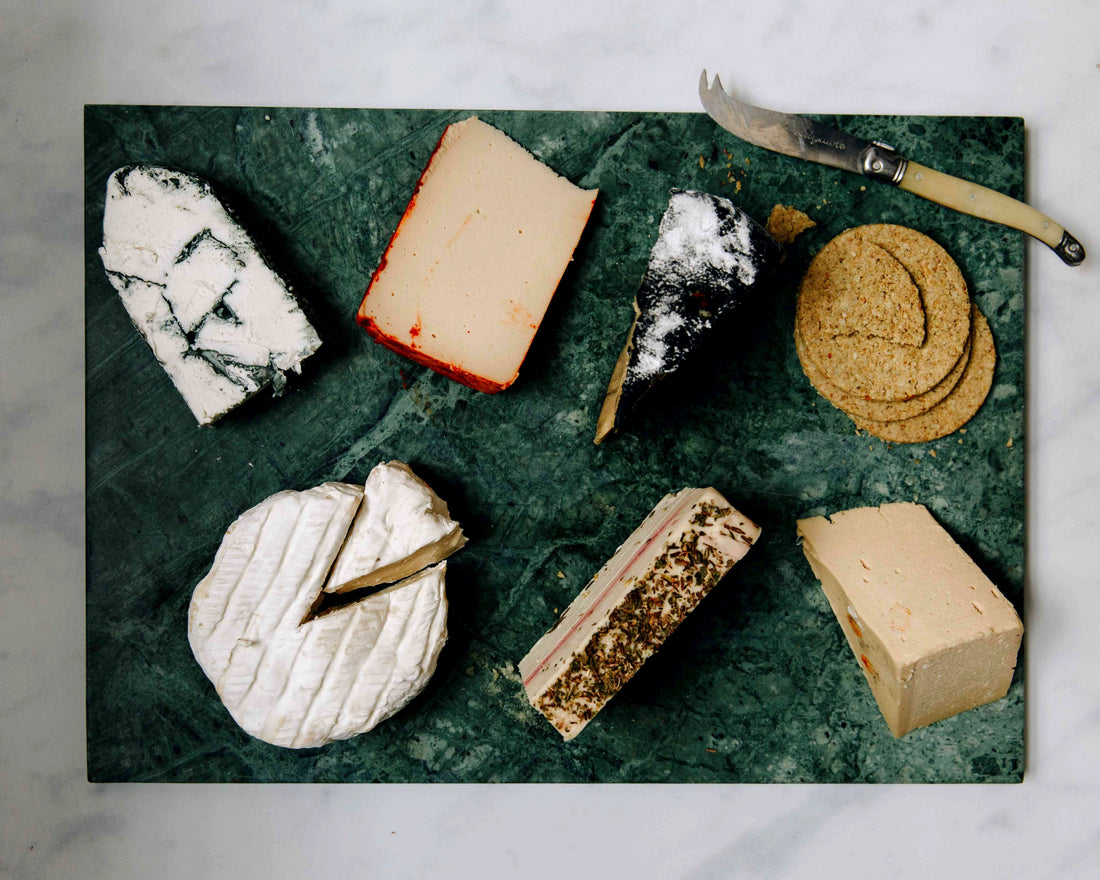
Fermentation, Flavour & Facts
“That’s not cheese!” If we had a pound for every time we heard it… well, we’d still rather have a wheel of Camemvert. Plant-based cheesemakers often get stick for calling their products “cheese,” but in truth, cheese - at its core - is about fermentation, culture and flavour. In this post, we’ll explain what defines cheese, how vegan alternatives follow similar processes, and why calling something “vegan cheese” makes perfect sense.
What Makes Cheese “Cheese”?
- Fermentation & Culture: Traditional dairy cheeses start with milk (cow, goat, sheep) that’s inoculated with starter cultures (bacteria or molds). Over time, those cultures eat sugars, create lactic acid, and develop the familiar tangy, savoury taste.
- Texture & Ageing: Many cheeses are aged under controlled temperature and humidity. Rinds form. Enzymes break down proteins and fats. The result is a wide spectrum: from soft, spreadable Brie to crumbly, sharp cheddar.
- Sensory Category: Ultimately, “cheese” is more about how a product tastes, feels and smells than just its ingredients. We expect a melting quality, a savoury umami character, and a certain richness on the palate.
Vegan Cheese: Same Principles, Different Ingredients
- Non-Dairy Bases: Common bases include cashews, almonds, coconut oil or soy. Our Camemvert has a butterbean base.
- Culturing & Fermentation: Many artisan vegan cheesemakers use live cultures—lactobacillus or penicillium molds - to ferment nut or seed-based blends. Over days or weeks, these cultures turn a bland paste into something tangy and complex.
- Aging & Rinds: Some vegan wheels are aged just like dairy cheese: kept in humidity-controlled rooms, turned regularly, covered in a natural rind. The result? True “melt-in-your-mouth” or “crumbly farmhouse” textures that rival dairy versions.
Why Calling It “Cheese” Matters
- Accuracy and Transparency: “Vegan cheese” clearly tells you two things: it’s dairy-free and it’s designed to behave like cheese. Customers aren’t confused—they know exactly what they’re getting.
- Sensory Expectation: If we labeled it “nut paste” or “plant spread,” you’d blink twice. When you see “vegan cheese,” you know to expect a certain flavour profile and utility (melting, slicing, grazing).
- Legal & Cultural Debate: Yes, some dairy lobbyists argue that only products containing animal milk can be called “cheese.” But semantically, “cheese” has roots in words meaning “to ferment,” not “to milk a cow.” Plus, from a marketing and user-experience standpoint, we believe that labels should match sensory expectations.
The Real Stakes in the Naming Debate
- Consumer Neophobia: People are naturally wary of unfamiliar foods. The term “vegan cheese” is less scary than “cashew brine-sealed fermented nut slab.”
- Fair Competition: When small plant-based producers can’t use familiar terms, they lose search visibility and shelf appeal. If you can’t find “vegan cheese” on Google or in-store, you won’t buy it.
- Industry Dynamics: Dairy industry groups sometimes use naming laws to slow down vegan innovation. But as tastes improve, consumers are less likely to be fooled by scare tactics—if your product actually tastes delicious, they’ll come back no matter what it’s called.
So the next time someone says “that’s not cheese,” you can smile and explain: cheese has always been about fermentation, culture and flavour. La Fauxmagerie’s vegan cheeses are every bit as carefully cultured, aged and crafted as their dairy counterparts... so yes, it really is cheese.
Want to taste for yourself? Shop our full range of cultured classics and plant-based wheels, and let flavour be your guide.